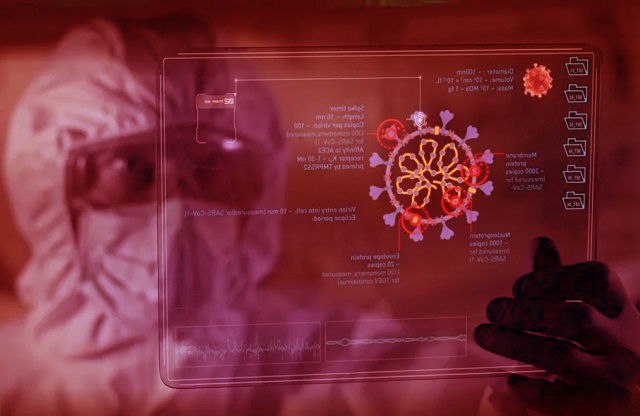German Scientists Discover That SARS-CoV-2 Nsp1 Suppresses Expression of HLA Class I and Class II Proteins
Nikhil Prasad Fact checked by:Thailand Medical News Team Aug 06, 2025 6 months, 1 week, 1 day, 6 hours, 17 minutes ago
Medical News: A Startling Immune Evasion Strategy Uncovered
Scientists in Germany have made a major breakthrough in understanding how the SARS-CoV-2 virus evades the immune system. A new study has revealed that a viral protein called Nsp1—produced by SARS-CoV-2—can suppress the body’s natural defense mechanisms by interfering with the expression of crucial immune molecules known as HLA Class I and Class II proteins.
 German Scientists Discover That SARS-CoV-2 Nsp1 Suppresses Expression of HLA Class I and Class II Proteins
German Scientists Discover That SARS-CoV-2 Nsp1 Suppresses Expression of HLA Class I and Class II Proteins
These findings were uncovered by researchers from the Institute of Virology and the Faculty of Medicine at the University of Freiburg in Germany. Their work sheds new light on how the virus escapes detection by the immune system and continues to thrive in the human body.
What Are HLA Class I and II Proteins and Why Are They Important
HLA (Human Leukocyte Antigen) proteins play a critical role in the immune response. Class I proteins are responsible for presenting viral fragments to killer T-cells (CD8+), which destroy infected cells. Class II proteins help present foreign particles to helper T-cells (CD4+), which coordinate broader immune responses.
When these proteins are suppressed or not produced correctly, the body’s immune system can no longer properly identify and attack infected cells. This opens the door for the virus to replicate and spread more freely throughout the body.
In this
Medical News report, we look deeper into the findings that highlight how SARS-CoV-2 uses Nsp1 to disable the immune system’s alert system.
Nsp1 Identified as the Main Culprit in Blocking Immune Signaling
Previous studies had speculated that another protein called ORF8 was responsible for impairing HLA functions. However, the new research shows that even in variants of the virus that lack ORF8—such as the Alpha strain—the virus still effectively shuts down HLA activity. This led scientists to suspect another viral player was involved.
By conducting detailed experiments using lung epithelial cells and advanced genetic tools, the researchers discovered that Nsp1 alone was capable of dramatically reducing both HLA Class I and II levels on the surface of infected cells.
Nsp1 was shown to suppress the production of key cellular components needed to build these proteins, essentially shutting down the machinery required to display viral particles to the immune system. It not only blocked the base-level expression of these proteins but also inhibited their activation even after exposure to immune-boosting signals like interferon-gamma (IFNγ).
How the Study Was Conducted
The researchers infected human lung cells (Calu-3) with different strains of SARS-CoV-2 and monitored HLA protein expression using flow cytometry and RNA sequencing. They also tested the effects of introducing specific viral pr
oteins like Nsp1, ORF8, and ORF3a into cells.
Only Nsp1 consistently led to a significant drop in both HLA Class I and Class II proteins, even when cells were exposed to IFNγ—an immune molecule known to boost HLA expression. RNA sequencing confirmed that Nsp1 caused a widespread drop in mRNA levels for many components required for HLA biosynthesis, such as B2M, CALR, and PDIA3.
Implications for Immunity
This discovery has major implications for how we understand COVID-19 progression, reinfection, and vaccine design. By suppressing HLA expression, SARS-CoV-2 makes it much harder for the immune system to detect infected cells, potentially allowing the virus to linger in the body longer and cause more damage.
This immune suppression could also explain why some individuals experience long-term symptoms, as their immune systems may never fully clear the virus.
Final Thoughts on the Study’s Importance
The study conclusively identifies Nsp1—not ORF8—as the primary factor responsible for silencing the immune system’s ability to recognize infected cells. This finding may explain why even those with robust immune responses can sometimes struggle to eliminate the virus entirely. Understanding this mechanism opens new doors for future treatments that could block Nsp1’s activity and restore the immune system's ability to function properly.
The study findings were published in the peer-reviewed journal: Viruses
https://www.mdpi.com/1999-4915/17/8/1083
For the latest COVID-19 News, keep on logging to Thailand
Medical News.
Read Also:
https://www.thailandmedical.news/news/human-leukocyte-antigen-hla-and-its-role-in-long-covid-and-persistent-antigens
https://www.thailandmedical.news/news/breaking-hla-g-protein-which-is-typically-upregulated-in-cancers-found-to-be-also-upregulated-in-covid-19-infections
https://www.thailandmedical.news/news/covid-19-world%E2%80%99s-first-hla-i-immunopeptidome-study-of-sarscov-2-infected-human-cell-lines-by-harvard-university-reveals-alarming-details
